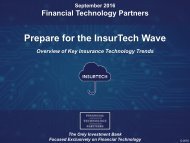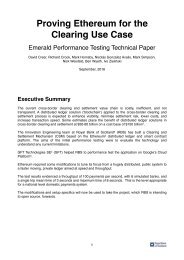Bitcoin and Cryptocurrency Technologies
1Qqc4BN
1Qqc4BN
Create successful ePaper yourself
Turn your PDF publications into a flip-book with our unique Google optimized e-Paper software.
About the authors<br />
Arvind Narayanan(Ph.D. 2009) is an Assistant Professor of Computer Science at Princeton. Narayanan<br />
leads the Princeton Web Transparency <strong>and</strong> Accountability project that aims to uncover how<br />
companies are collecting <strong>and</strong> using our personal information. He also leads a research group studying<br />
the security, anonymity, <strong>and</strong> stability of <strong>Bitcoin</strong> <strong>and</strong> cryptocurrencies. His doctoral research showed<br />
that data anonymization is broken in fundamental ways, for which he jointly received the 2008 Privacy<br />
Enhancing <strong>Technologies</strong> Award. You can follow him on Twitter at @r<strong>and</strong>om_walker.<br />
Joseph Bonneauis a Technology Fellow at the Electronic Frontier Foundation <strong>and</strong> Postdoctoral<br />
Researcher at Stanford. In addition to researching <strong>Bitcoin</strong> <strong>and</strong> cryptocurrencies he has worked on<br />
passwords <strong>and</strong> web authentication, secure messaging tools, <strong>and</strong> HTTPS for secure web browsing. He<br />
received a PhD from the University of Cambridge under the supervision of Ross Anderson <strong>and</strong> an MS<br />
from Stanford under the supervision of Dan Boneh. Earlier he was as a Postdoctoral Fellow at CITP,<br />
Princeton <strong>and</strong> he has previously worked at Google, Yahoo, <strong>and</strong> Cryptography Research Inc.<br />
Edward W. Feltenis a Professor of Computer Science <strong>and</strong> Public Affairs at Princeton, <strong>and</strong> the<br />
founding Director of the Center for Information Technology Policy. In 2011‐12 he served as the first<br />
Chief Technologist at the U.S. Federal Trade Commission. His research interests include computer<br />
security <strong>and</strong> privacy, <strong>and</strong> technology law <strong>and</strong> policy. He has published more than 100 papers in the<br />
research literature, <strong>and</strong> two books. His research on topics such as Internet security, privacy, copyright<br />
<strong>and</strong> copy protection, <strong>and</strong> electronic voting has been covered extensively in the popular press.<br />
Andrew Milleris a computer science PhD student at the University of Maryl<strong>and</strong>, <strong>and</strong> previously<br />
received his M.S. degree from the University of Central Florida. He has studied cryptocurrencies since<br />
2011, <strong>and</strong> has authored scholarly papers on a wide range of original research, including new<br />
proof‐of‐work puzzle constructions, programming languages for block chain data structures, <strong>and</strong><br />
peer‐to‐peer network measurement <strong>and</strong> simulation techniques. He is an Associate Director of the<br />
Initiative for Cryptocurrencies <strong>and</strong> Contracts (IC3) at Cornell <strong>and</strong> an advisor to the zcash project.<br />
Steven Goldfederis a PhD student in the Department of Computer Science at Princeton University,<br />
advised by Arvind Narayanan. He is a member of the Security & Privacy Research Group, a CITP<br />
Graduate Student Fellow, <strong>and</strong> a National Science Foundation Graduate Research Fellow. His research<br />
interests include cryptography, security, <strong>and</strong> privacy, especially decentralized digital currencies. His<br />
current work involves increasing the security of <strong>Bitcoin</strong> wallets.<br />
Jeremy Clarkis an Assistant Professor at the Concordia Institute for Information Systems Engineering<br />
in Montreal. He received his PhD from the University of Waterloo in 2011, where he applied<br />
cryptography to designing <strong>and</strong> deploying verifiable voting systems, including Scantegrity — the first<br />
use of an end‐to‐end verifiable system in a public sector election. He became interested in <strong>Bitcoin</strong> in<br />
2010 <strong>and</strong> published one of the first academic papers in the area. Beyond research, he has worked<br />
with several municipalities on voting technology <strong>and</strong> testified to the Canadian Senate on <strong>Bitcoin</strong>.<br />
308









